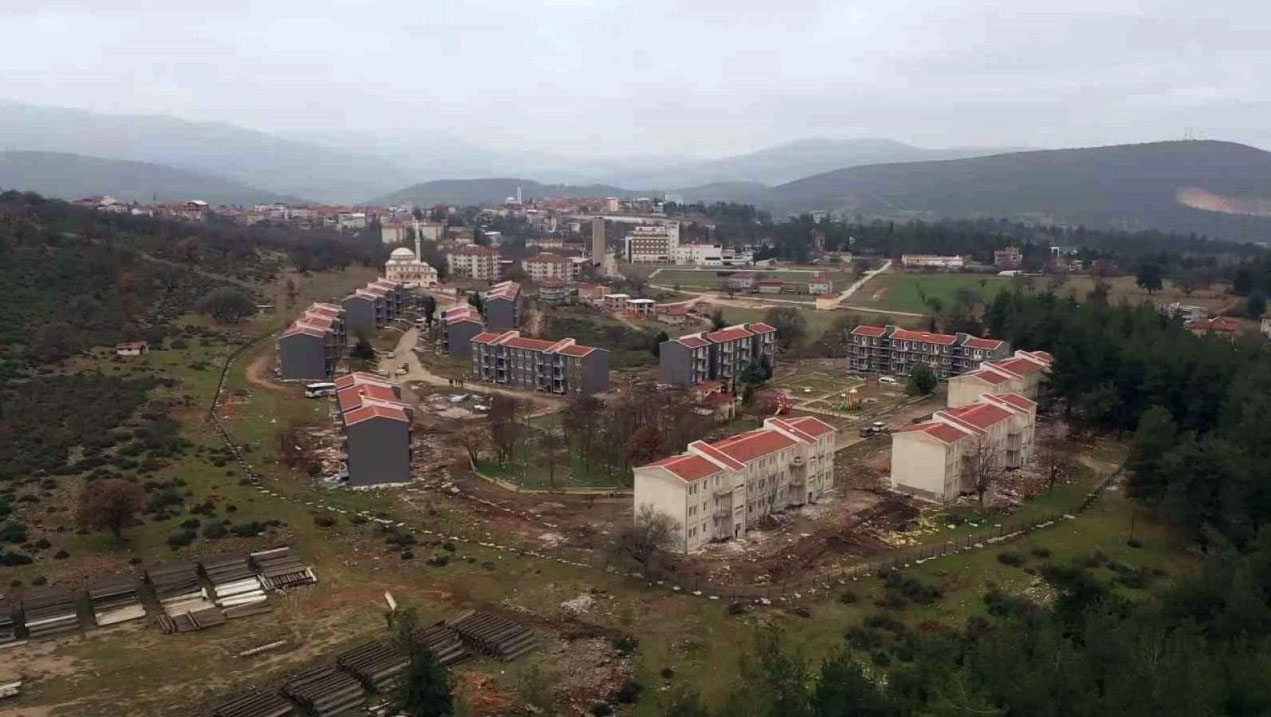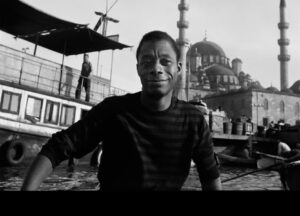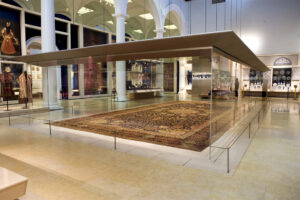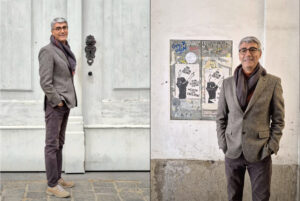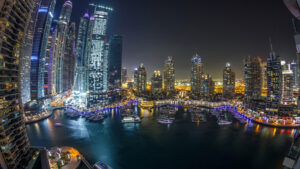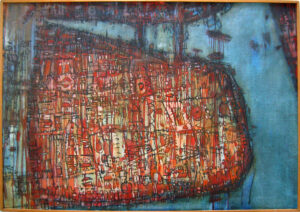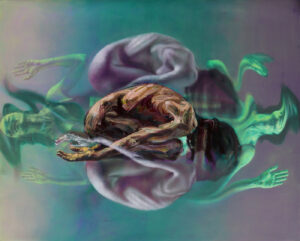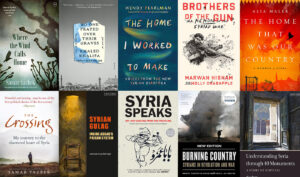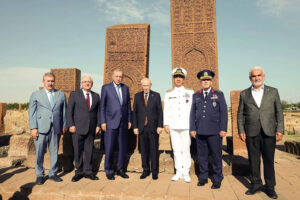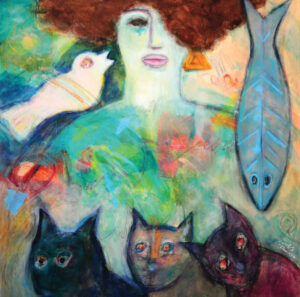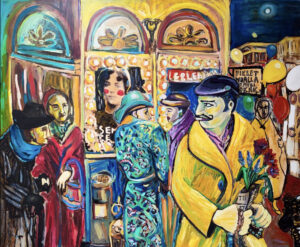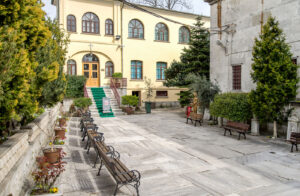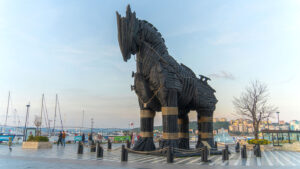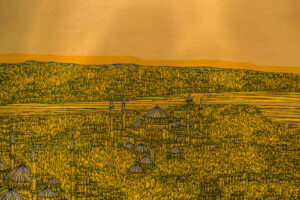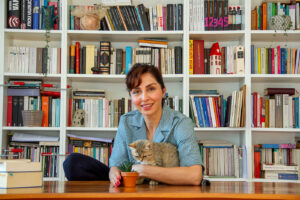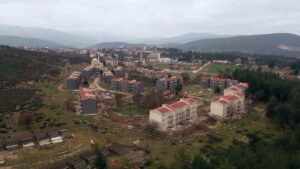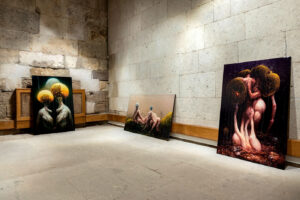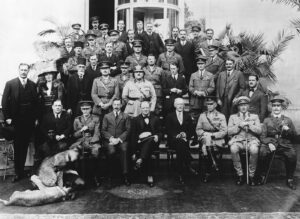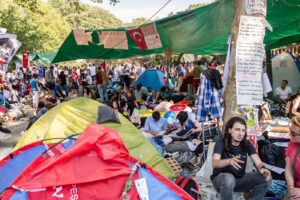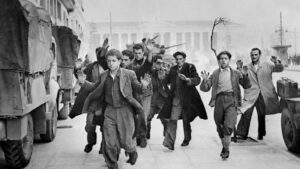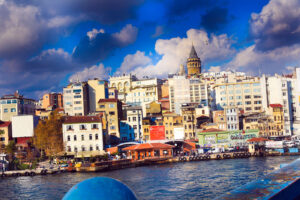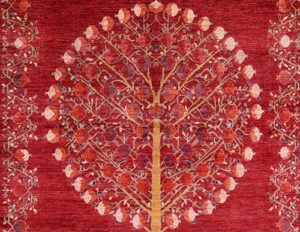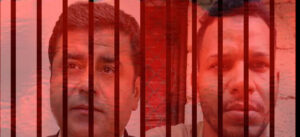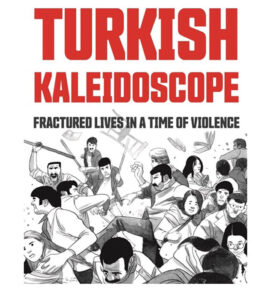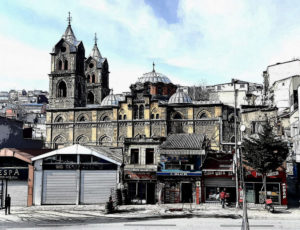Lojman, an unnerving and dark domestic drama, centers around a Kurdish mother and her three children who live on a desolate plateau at the foot of Turkey’s Van province. Ojen’s protagonist struggles to come to terms with all that motherhood has taken away from her, as she questions social roles and institutions. Ebru Ojen is among the ten most important emerging voices in Turkish literature.
Lojman, by Ebru Ojen
City Lights Books 2023
ISBN 9780872868984
Kaya Genç
In Turkish, a lojman is an enclave defended by force of arms against enemies. It’s no wonder the Turkish state has long used the word to describe resident complexes intended to house the state’s educational personnel. In the Kurdish towns of eastern Anatolia, lojmans are symbols of Turkish officialdom. Schoolteachers, who are civil servants, live there in isolation from their surroundings. They are meant to embody the ideals of the Turkish Republic while the Turkish security establishment protects them behind the curtains. In Ebru Ojen’s novel Lojman (City Lights Books, 2023), elegantly translated into English by Aron Aji and Selin Gökçesu, a woman and her three children are locked up in one of these complexes. We watch them rot there, first emotionally, then physically.
It’s a nightmarish tale.
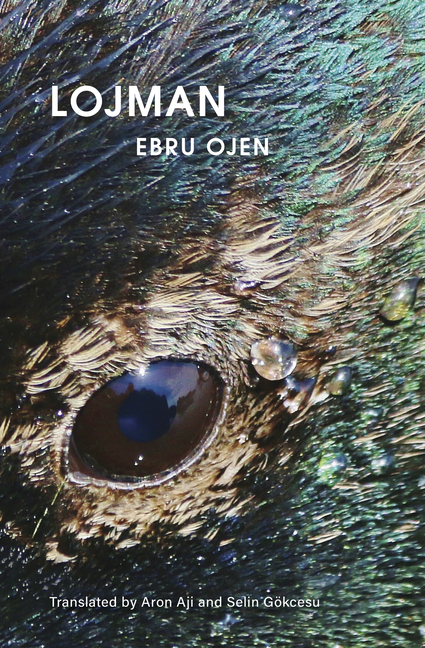
Isolated in their lojman overlooking the landscape of the Erciş Plateau in Van, the family is a neurotic bunch. Selma, the mother, despises her children, even fantasizing about their imminent death. Starving them is one option, strangling another. Görkem, her daughter, hates Selma equally, dreaming of finishing her off in various violent scenarios. As for Murat, her son, and the newborn baby, their thoughts and feelings remain a mystery — until they, too, raise their voices in the book’s finale.
Lojman features two well-drawn character studies. Görkem, the daughter, is a woman of contradictions. She wants to explore the world yet is full of fear. She’s happy to take advantage of the luxury of being a child, yet resents Selma’s independence. Her distress is physical, one that engulfs her body. She can’t stand carrying “traces of Selma’s blood in her veins.”
In a striking birth scene, her hatred comes to the fore. After feeling the “foul-smelling fluid that trickled from Selma’s loins” on her toes, Görkem hears Selma’s “gruesome groan of pleasure” and notices how closely pain and pleasure resemble one another. “If Görkem hadn’t known that Selma was giving birth,” Ojen writes, she would have imagined that Selma was making love to Metin — the absent husband and the children’s father, whose vanishing, two weeks before the events of the novel begins, increases the tensions in the household.
This is not a page turner, and the intensity of Lojman’s initial chapters will likely rattle some readers. The scene where Görkem heats a razor blade on the stove, helping her mother with labor, is a case in point. The outcome, the actual baby, unnerves her powerfully with his materiality, and Ojen captures Görkem’s alienation in a visceral confession: “I wish it would never be born, wish its lungs were filled with poison instead of breath so I wouldn’t have to struggle with such pointless questions.”
With four of them now sharing the lojman, their sense of suffocation greatly increases.
Ojen draws vivid vignettes of the isolated lojman in winter. She characterizes the Erciş Plateau “as harsh and desolate as an arctic desert.” As the doors and windows of their room whistle, the only sounds missing, she notes, were the cries of owls and wolves. Outside, they see green headed and mottled mallards who take wing from dry reedbeds and fly toward the valley near their village.
A Kurdish writer born in 1981 — the same year I turned up — Ojen is aware of the implications of placing her characters in an outpost of the Turkish state. “In the East, the state builds its schools and the lodging for its teachers away from the residential areas of the villages,” she writes. “This lojman was no different, a forgotten dot on the village’s suffocating landscape, distant and alone under the dark clouds.” She adds a gothic layer to her political tale: her lojman looks out “onto the plains through a thick fog that conjured the atmosphere of ghoulish tales,” with her characters constantly fearing the existence of “fearsome winter monsters, jinn, dead donkeys, and poison trees” outside, laying siege to their lojman, “having sworn an oath to terrify anyone who dared to step outside.”
Ojen’s tale rests on two axes. Görkem, the daughter, desires Teacher Mahir, who was assigned to the village school the fall before. All she wants is his hands on her body. What makes him more attractive is his criminal past: she hears that he has butchered his mother, which adds a gothic allure to his person. There is a gruesome description of her infatuation: “She pictured his perfect teeth sinking into his mother’s flesh, the deepening grooves of his dimples, his mouth savagely taking possession of his mother’s body as the snow invaded the plains from end to end.”
Meanwhile, Selma desires a return to her life before becoming a mother, when she was the center of Metin’s sexual attention. Hearing the baby wail, she lifts him and looks at “this creature that had ripped all her strength from her, disturbed her chemistry, plundered her mineral deposits, and come into existence by practically destroying her. What a powerful gaze!” In her view, the baby is responsible for destroying the passion between her and her husband, Metin. “Because of the children, no trace of passion was left between them. It was only when she turned her back to the things they had created together that she felt closer to Metin, more in love with him. She was seized with a desire to slam her baby against the wall and kill it.”
The narrative zigzags between Görkem’s fury and Selma’s solitude, sometimes annoyingly so. As Görkem takes refuge in the only thought that makes her happy, the image of Teacher Mahir, she smiles “as she imagined him in his unbuttoned, stained, faded shirt, his greasy hair, his hands bright red with his mother’s blood.” Her lust then turns violent as Görkem fantasizes about sucking on the blood from her lover’s lips. “As his blood flowed, her thirst became insatiable. Her tiny mouth expanded like a hose sucking up sludge.”
As mother and daughter fight it out in consecutive monologues, the newborn remains unattended. His “appealing but also repulsive” existence unnerves Selma. She feels like a “complete alien in the realm of motherhood” and desires to be free from all obligations. Looking at her children who sit around the stove “like pups,” Selma is certain they’re there to enslave her.
It’s a testament to Ojen’s skill as a writer that this polyphony of hateful and murderous feelings doesn’t grate on the reader’s nerves, even as we reach the book’s middle sections. Instead, they grow on one. To her children, Selma is like an Emma Bovary figure — stuck in the world of books, living out her fantasies, and deserving retribution. And yet, while initially shocked by Selma’s thoughts, I found myself sympathizing and even agreeing with them after a point. What Selma desires in place of her married life is clear: “Books, hours and hours of reading, outlandish thoughts distanced Selma from her responsibilities; in her own mind, she was rejecting motherhood.”
For her, the struggle to fit into the typical mold of womanhood is pointless. “She hadn’t warmed up to either married life or motherhood,” we learn. “She saw love and affection as fabrications, words and emotions that bound humans into a dark ignorance with dreadful chains.” I nodded approvingly while reading her wish to live alone in the “mountain village, amidst the snow, with that melancholy gloom.” Living in the middle of nowhere, “just a mountain and us,” her biggest fear is to lose her link to poetry. “What wouldn’t she give to touch the noisy hawthorn leaves once again, to lounge on her armchair after a brief walk and read a few verses.” Because of family life and its responsibilities, “the tree she had been nurturing inside her was left without water; she had been stripped of the strength to feed it the few lines it craved.” Reading those lines, I wanted Selma to be safe and free.
Illegitimate Literature—Interview with Novelist Ebru Ojen
Haunting the novel is also a mystery: Where is Metin, the husband and the father, who disappeared? Yasin, who also lives in the lojman with his wife Songül, is trying to figure this out. In Metin’s absence, Yasin takes over the task of raising the lojman’s flag. The lack of Metin’s patriarchal authority, an extension of the power of the Turkish state, both frustrates and liberates his family members. While the dutiful Yasin obsesses about raising the flag every morning, Selma questions lojman life. “Why did the flag have to be raised? Who cared about this in the middle of a doomsday snowstorm?” She sees Yasin as an “otherworldly creature” whose voice is “robotic, metallic, sexless” and who resembles “a computer with a human body.” When she notices a nearby shovel with a black handle, “an irrepressible vision appeared before her eyes, in which she hit Yasin on the head with the shovel over and over, smashing his skull until his brains spilled.”
Each turn in the book’s dark plot leads Selma to a further reckoning with her life choices. Everything that happened to her “was because of Metin’s infinite love of children,” she decides near the end. She had been in love with Metin but never wanted to have a child with him. “With all her heart, she had rejected the gift of fertility that nature had offered her as if it were some sort of blessing.” Yet somehow, she’s been cajoled into giving birth.
As Selma’s frustration grows, the living room and the walls of their apartment embody her feelings. She accuses her children of taking her love from her. “Disgusting worms, they had desiccated her sexuality, they had robbed her of her appetite for a bit of skin, casting handfuls of earth over everything she enjoyed.” Yet she tries to keep her sanity, but grows increasingly afraid, “afraid of her children, of her baby who didn’t even have a name, of the way it was always hungry.” As the voices of the symbolic order grows louder, “they leaked from the lojman’s walls and wrapped around her throat, they seeped under her skin, into her blood.”
Selma’s stream of consciousness recalls the writings of the great Turkish feminist writer Tezer Özlü, who recorded her despair in the face of Turkish patriarchy in Cold Nights of Childhood (Transit Books, 2023), recently translated into English by Maureen Freely. And the depictions in Ojen’s Lojman of the barren heartlands of Anatolia resemble Ferit Edgü’s The Wounded Age and Eastern Tales (NYRB Books, 2023), rendered into English by Aji, one of Lojman’s translators.
As the tale darkens, we get a clearer picture of the book’s protagonists. Ojen’s joy in creating a set of situations that help her dramatize her characters’ sensitivities is palpable. When Görkem finds a wounded mallard and almost kills it in her attempted rescue, Selma informs her daughter: “It’s going to die. It won’t make it. Let’s bandage the wounds anyway.” Even this desire for care and comfort discomfits Görkem, who questions why she isn’t receiving such mercy. As Selma tenderly takes care of the mallard, Görkem fumes, “How come this monstrous woman could show the mallard a care she never showed her children?”
My favorite scene describes a visit the family pays to the apartment of Yasin and his wife Songül, who inquire about the baby’s name and health. Selma’s children admit he doesn’t have a name, which shocks the couple. Songül also notices how frail the baby is and asks whether Selma’s milk is not enough for him. “Selma didn’t respond.” The inquisitive gaze of Songül and Yasin soon exhausts Selma. Back home, she broods on “Songül’s tedious meddling with others’’ lives in the guise of honesty, benevolence, responsibility, and other drivel.” For Yasin, she harbors more violent feelings, wishing “she could deliver him a blow and smash his brain and his benevolence.”
Lojman’s second part is weirder, and I loved it all the more for that. It begins with Görkem waking up to find herself suspended, hanging in the air. Selma, too, is in the same position. A strange jelly surrounds them, and Ojen lovingly details her uncanny creation: “They both hung motionless in the jelly like two figurines glossed with sadness. Although Görkem was convinced she was having a bad dream, she couldn’t stop her body from trembling in fear.” Even in this position, Görkem is ashamed of her mother and compares Selma to “a fly on a pile of horse dung.”
In the book’s disturbing finale, the baby boy, practically reduced to only his mouth, takes over the narrative. As the mouth is activated, with his “lips quivering, curving, setting in motion the rest of its moist features,” Selma grows worried that the baby might swallow them all.
This parting of the lips becomes a sublime act. As the baby grows “big and ruddy,” I was reminded of Lars von Trier’s miniseries Riget, aka The Kingdom, which similarly interweaves architectures, bodies and the subconscious. Selma’s baby boy grows horrifyingly: “Cheeks puffed up, arms and legs ballooning in rolls of fat, chin multiplied in pudgy waves.” Who is this creature? Did Selma birth it?
In transforming this tale of suffocating cabin fever into a gothic horror story and concluding it with great panache, Ojen has showcased her remarkable storytelling skills, which readers in Turkey had discovered and now English readers will be able to sumptuously enjoy.



